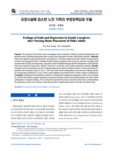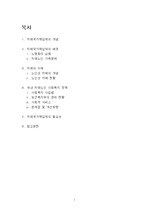

-
서지정보
· 발행기관 : 한국노인간호학회
· 수록지 정보 : 노인간호학회지 / 16권 / 3호 / 276 ~ 287페이지
· 저자명 : 유선영, 탁영란
초록
Purpose: The purpose of this study was to investigate family caregivers' feelings of guilt and depression and identify factors predicting depression after nursing home placement of older adult family members. Methods:Data were collected using questionnaires completed by 112 family caregivers of older adults in nursing homes in Seoul and Gyonggi Province. Feelings of guilt in family caregivers were measure using the Caregiver Guilt Questionnaire (CGQ) and depression, using the Center for Epidemiological Studies-Depression scale (CES-D).
Data were analyzed using t-test, ANOVA, Pearson’s correlation, and multiple regression analysis. Results:Average score for depression was 22.3 indicating depression status in family members. Factors predicting depressionwere feelings of guilt (β=.39, p<.001) and older adults' participation in the decision-making process for nursing home admission (β=.28, p=.001), which together accounted for 28.7% of the variance in depression.
Conclusion: Findings show that families of elders in nursing homes experience depression, which can be reduced by a family intervention program designed to decrease feelings of guilt and provide guidance on older adults'participation in decision-making. The nursing home placement process should include help in understanding the importance of the role of family in promoting positive relationships between the elder and their family.영어초록
Purpose: The purpose of this study was to investigate family caregivers' feelings of guilt and depression and identify factors predicting depression after nursing home placement of older adult family members. Methods:Data were collected using questionnaires completed by 112 family caregivers of older adults in nursing homes in Seoul and Gyonggi Province. Feelings of guilt in family caregivers were measure using the Caregiver Guilt Questionnaire (CGQ) and depression, using the Center for Epidemiological Studies-Depression scale (CES-D).
Data were analyzed using t-test, ANOVA, Pearson’s correlation, and multiple regression analysis. Results:Average score for depression was 22.3 indicating depression status in family members. Factors predicting depressionwere feelings of guilt (β=.39, p<.001) and older adults' participation in the decision-making process for nursing home admission (β=.28, p=.001), which together accounted for 28.7% of the variance in depression.
Conclusion: Findings show that families of elders in nursing homes experience depression, which can be reduced by a family intervention program designed to decrease feelings of guilt and provide guidance on older adults'participation in decision-making. The nursing home placement process should include help in understanding the importance of the role of family in promoting positive relationships between the elder and their family.참고자료
· 없음태그
-
자주묻는질문의 답변을 확인해 주세요

꼭 알아주세요
-
자료의 정보 및 내용의 진실성에 대하여 해피캠퍼스는 보증하지 않으며, 해당 정보 및 게시물 저작권과 기타 법적 책임은 자료 등록자에게 있습니다.
자료 및 게시물 내용의 불법적 이용, 무단 전재∙배포는 금지되어 있습니다.
저작권침해, 명예훼손 등 분쟁 요소 발견 시 고객센터의 저작권침해 신고센터를 이용해 주시기 바랍니다. -
해피캠퍼스는 구매자와 판매자 모두가 만족하는 서비스가 되도록 노력하고 있으며, 아래의 4가지 자료환불 조건을 꼭 확인해주시기 바랍니다.
파일오류 중복자료 저작권 없음 설명과 실제 내용 불일치 파일의 다운로드가 제대로 되지 않거나 파일형식에 맞는 프로그램으로 정상 작동하지 않는 경우 다른 자료와 70% 이상 내용이 일치하는 경우 (중복임을 확인할 수 있는 근거 필요함) 인터넷의 다른 사이트, 연구기관, 학교, 서적 등의 자료를 도용한 경우 자료의 설명과 실제 자료의 내용이 일치하지 않는 경우
“노인간호학회지”의 다른 논문도 확인해 보세요!
-
골관절염 여성노인의 불확실성: 통증, 자가간호역량, 건강보존과의 관련성 9 페이지
Purpose: The purpose of this study was to examine the relationship of uncertainty to pain, self-care agency and health conservation and to identify factors affecting uncertainty in elderly women with .. -
치매노인 가족부양자의 부양부담감 관련요인에 관한 선행연구 고찰 13 페이지
Purpose: The aim of this study was to review studies on factors related to dementia caregiver burden (CB) in Korea. Methods: By a literature search of five major health and social science databases in..
찾으시던 자료가 아닌가요?
지금 보는 자료와 연관되어 있어요!
문서 초안을 생성해주는 EasyAI





